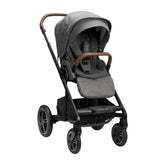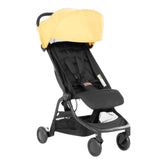A Parenting Dialogue: Pushing Back on Unsolicited Advice

I’ve just had it up to here with unsolicited advice from my mother-in-law! I’m a stay-at-home mom to a little one who is 9 months old and learning to walk. She's super curious and likes to play. But she's going through a clingy phase. It's normal, and nothing to worry about. She doesn't like to be without me, but she's not unbearable – not even close! My mother-in-law, well, she would just stick her in daycare so she can "socialize" and have me go back to working in an office (nothing at all against people who do that, it's just not how I want to do it right now). But I feel like I have to justify myself to her.
I'm getting tired of the hints she sends and the arrogant attitude of "Yeah, I raised two great kids so just do what I did." How can I tell her to just leave it alone? Should I just be direct and tell her to drop it? Do I just keep taking it and pretend like I don’t get it? She’s driving me crazy.
--Aggravated Daughter-in-Law
The New Mom
I think the advice people give or things they try to push onto you are based on experiences from their past that make them feel good, whether it’s advice that works for you or not. We had some older family members who tried to get us to do things a certain way when our son was born because that’s how they did things with their kids. They thought it was the “right” way. But when we rejected their method and said no, they were completely insulted and mad at us. They basically felt like we were implying their advice was wrong and that we were saying what they did to their kids was “bad.” And of course, we weren’t saying that at all! It’s just that their way didn’t work for our family. Maybe your mother-in-law thinks that because you’re making different choices from her that you’re implying “her way” is bad.
Maybe you could get your partner to talk to her first. The danger here is in alienating yourself from your daughter's grandmother. My in-laws are still very rough to deal with, and it's always a tricky line… but it can be done. Choose your battles. Let her have her victories when you can, but claim the things that are important to you. Most of the time, it doesn't matter to me that my in-laws are wrong, and I can just let them be. On some issues, though, I have to put my foot down.
-- Shawn, mother of one toddler
The Experienced Mother
Look, I get the temptation to offer advice – I’ve got four grown kids myself! I sometimes offer advice, but first I ask if they'd like to know what I did. If I get any trailing "Uuuuhh..sure," then I usually just say “It’s okay if you don't want my advice–I won’t be offended.” Then I immediately change the subject. Some people really are trying to be helpful. Other people (and it sounds like your MIL is one of them) just want to spout advice to make themselves feel superior and that they know better than everyone else.
I say just be firm and call her out. It’s obvious she says arrogant things to belittle you. So call her out on it. Make her feel uncomfortable. If she says, "Do everything my way because I'm a perfect parent!" then you respond, "Are you saying you're a better parent than me? Huh, that's not nice." Or try, "That's rather passive-aggressive, did you mean for that to come across that way?"
You don’t have to be rude, but be firm. She says, "You spoil your daughter – don't pick her up so much!" You reply, "Haha, back in your day we thought that was true, but thankfully now we know better now." If she tries to offer the same judgemental, unsolicited advice again, you comment, "Wow, that's embarrassing, don't you remember that we recently had a conversation about why I won't be doing X that way?" When people are being passive-aggressive the best thing to do is let them know you know what they're doing and that crap will not fly.
-- Katie, mom of four grown children
The Psychologists' Approach
When trying to decide how to respond to unsolicited advice, therapists advise that the key is to reply in a way that doesn't compromise your personal power. They recommend responding to unhelpful advice in one of the following ways (listed below in order from least aggressive to most):
- "I'll think about that." Even if you won't actually plan to think about it, it’s a kind response. The catch, however, is that the person may circle back with you to check whether you actually accepted their advice.
- "Good idea. I'll consider if that's right for me." This is a good, straightforward way of letting the advice giver know that their preference may not be what works for you.
- "That's an interesting opinion, but I prefer to do it this way." This statement is effective when the person is hovering and expecting an immediate change in whatever it is you’re doing. If you don’t want to comply with their advice, just tell them.
- "I'm not looking for any advice right now." Whether your mother-in-law is giving you outdated, unsafe sleep training advice or another playground mom is weighing in on your child’s vaccination status, make it obvious you don’t want to hear it. Be decisive and firm so the advice giver knows you’re not interested.
- "That's not actually in line with my values." When they suggest you do something you don’t believe in, let them know. If their suggestion has some value, you can recognize that. For example, “Yes, spanking might get them to stop misbehaving, but I don’t believe in hitting children.”
- "I'm not going to do that." Often it’s those who are most ignorant about the details of your situation who are pushiest with their advice. If you’re given suggestions that are clearly not for you, just be straightforward and say you’re not going to do it.
The Holistic Approach
Early childhood educator and creator of the Easy Gentle Parenting courses Lizzie Mash offers a similar approach when dealing with unsolicited parenting advice.
“What worked for someone else might not work for you, and you shouldn’t feel the need to do what other people tell you to when it comes to parenting. You have to decide what’s best for your family and lean into the fact that you are the expert of your child – not them.”
When the advice seems well-intentioned, Mash recommends starting by being polite, then simply agreeing or saying thank you for the advice. If you don’t agree, you can tell them you’ll look into it, change the subject, or simply say “thanks, but no thanks.”
“You can feel free to listen politely,” says Mash “even if you know the advice isn’t right for you and your child.”
She also points out that being polite isn’t always the most important thing: “If someone is not just giving you unsolicited parenting advice but also trying to take over how you do things, saying you’re a bad parent, etc, then you might need a more direct, blunt, or confrontational response…Remember that you are also modeling behavior for your children. You don’t have to be cruel and insult the person in return, but it sets an excellent example to show your children that you won’t allow others to mistreat you. You don’t have to have a relationship with someone who is constantly insulting you.”
The Takeaway on Unsolicited Parenting Advice
When it comes to unsolicited parenting advice, always consider the source and your relationship with that individual. If it’s a random stranger in the park who tells you your baby shouldn’t use a pacifier, offer a polite response and move on. However, if it’s a relative who’s doling out daily pearls of wisdom that you’d rather not have, you’ll need to set some boundaries. The former is a brief interaction you can ignore if you choose, while the latter can be a pattern that needs to end for the sake of your relationship.
You may have times when you need to distance yourself from those who can’t help themselves when it comes to giving you parenting advice. If your words aren’t getting through to them, it might be time to limit your contact with them for a while.
That said, don’t toss out every piece of advice you hear simply because you weren’t asking for it. While some suggestions may be offered with a sense of superiority and an “I know best” attitude, others are simply offering extra information just to help. An unsolicited tip may still be useful. And be sure to say thank you when you do get a helpful tidbit about bedtimes or weaning that you weren’t expecting.









